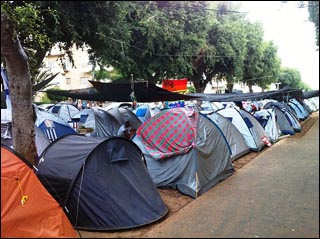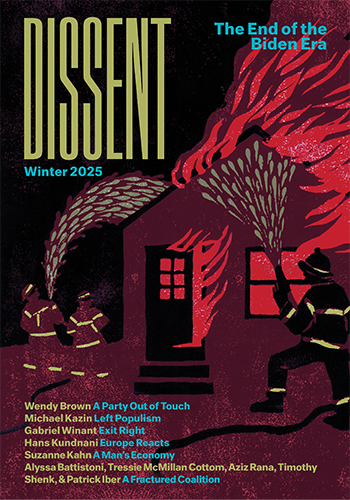The Tent Protest: Israel’s Social-Democratic Movement
The Tent Protest: Israel’s Social-Democratic Movement
N. Zilber: Israel’s Tent Protest
 IN THE middle of a humid and sweaty Middle Eastern summer, Israel is undergoing its own version of the Arab Spring. What began as a youth-led, Facebook-generated protest movement against the high cost of housing has, in just over two weeks, turned into a full-blown middle-class rebellion.
IN THE middle of a humid and sweaty Middle Eastern summer, Israel is undergoing its own version of the Arab Spring. What began as a youth-led, Facebook-generated protest movement against the high cost of housing has, in just over two weeks, turned into a full-blown middle-class rebellion.
It appears that the most unlikely of actors, the Israeli public, has succeeded where so many other outside actors have failed: to put real pressure on Israeli Prime Minister Benjamin Netanyahu. With 150,000 Israelis all across the country taking to the streets this past Saturday to demand, in effect, government intervention to lower the cost of living and an increase in state welfare, Netanyahu is facing the stiffest challenge yet to his premiership.
THE UNREST began in mid July, when the Tel Aviv landlord of twenty-five-year-old filmmaker Dafni Leef raised her (already substantial) rent. Instead of paying the new fee or finding another, equally expensive apartment, she created a Facebook event publicizing the fact that from July 14 onward, her new home would be a tent in central Tel Aviv, on the city’s posh, European-styled Rothschild Boulevard. As she tells it, this was done half in jest and half in protest, but she invited people to join her. A movement demanding affordable housing was born.
That first night there were around 150 people with a few tents. They sat in two different circles, speaking over each other through megaphones. It looked like what it was: a disorganized group comprised mainly of students and hippie-types—a colorful distraction.
Two days later, by the weekend, the so-called “tent city” on Rothschild had grown: there were now about thirty tents visible, and a faux kitchen, laundry room, and salon were built. Signs were put up with slogans like “Where is the hope?” (a play on the name of the Israeli national anthem) and “Housing is a right, not a privilege.”
At the end of its first week, the “tent protest,” as it came to be known, was undeniably gaining momentum. Other tent protests arose across the country, reaching a dozen additional cities and towns. The student union also joined in. The major newspapers and television stations led their coverage with the story, and even Netanyahu addressed the issue and said he “empathized” with the protestors.
“This is Woodstock,” one protest organizer told me as he surveyed the growing scene at the epicenter of it all, Rothschild Boulevard.
Crucially, at this juncture, the new grassroots movement was adamantly apolitical. Right- and left-wing politicians who came to the various tent cities were jeered at with equal resentment. I asked Yigal Rambam, the thirty-three-year-old strategic mind behind the organization, if he had any reservations about the student unions or various leftist organizations joining up with the tent protest.
“They’re here, right?” he asked rhetorically. “Everyone should come—[Netanyahu’s] Likud, the national religious parties, [the far-right] Kahana…”
In the organizers’ minds, this was a broad-based social movement that cut across age, ethnicity, geography, and political affiliation. Unity was paramount, so any talk about divisive “political” issues like the peace process or West Bank settlements was avoided.
A little over a week into the protest came the first real test of strength: a march and rally through Tel Aviv. Up until that point, it was easy for some to dismiss what was happening as just a few spoiled Tel Aviv hipsters complaining about the high rent in the big city. As one elderly lady muttered under her breath as she walked down Rothschild, “Why don’t they move to Ramat Gan [a working-class town adjacent to Tel Aviv]?”
Yet anyone who bothered to come to Rothschild during those first few days realized that the protest was tapping into a deeper social frustration.
New parents with young kids as well as the middle-aged began to arrive in a show of solidarity. The overwhelming sentiment was that despite Israel’s strong economic growth rate and historically low unemployment, the average citizen was struggling simply to “close the month,” as they say here. As one columnist put it, “This is the time for ‘political economy,’ in the sense of economics for human beings,” and not just numbers.
THE FIRST demonstration, on Saturday, July 23, was an overwhelming success: anywhere between 20,000 (the police estimate) and 30,000 people took to the streets of Tel Aviv that night, chanting, “the people want social justice,” “welfare state,” and “a whole generation demands a future.”
By the movement’s second full week, Netanyahu was undeniably feeling the pressure. An opinion poll came out putting public support for the protest at a staggering 85 percent. Another poll saw Netanyahu’s approval rating drop by twenty points in a matter of days. In a hastily arranged press conference, Netanyahu put forward his own “affordable housing” proposal focusing on bureaucratic and land reform, as well as increased subsidies to students.
The television coverage of the event had shades of the Egyptian revolution to it, with a split screen showing the government’s press conference on one side, and the demonstrators’ angry reactions at the Rothschild tent city on the other. The proposals were roundly rejected, even by the student union. “[Netanyahu] is trying to bribe the students,” said Yigal Rambam. The prime minister’s initiative was dismissed as a “divide-and-rule” strategy.
By the following day, the head of the massive public-sector labor union, the Histadrut, threw his lot in with the tent protestors. Toward the end of the week, over 10,000 parents and their children took to the streets of several cities for a “baby stroller protest,” decrying the high cost of raising a family in Israel. Even the Israeli-Arab sector began getting involved, from the northern town of Nazareth to the Bedouins of Be’er Sheba in the south. It was a good opportunity, as one Arab spokesman put it, to highlight the very real housing crisis in their own communities.
At this point, what had started with a few tents at the northern end of Rothschild had spread like a contagion all the way down the boulevard—tent after tent, block after block, for a few kilometers. As one sign outside a row of tents put it, “The government doesn’t support this settlement.” People were actually living amid the tents, playing guitar, drinking beer, and talking till the small hours of the night. The same scenes, albeit with a less bohemian vibe, were and still are playing out in every corner of the country.

THIS PAST Saturday night, more mass demonstrations took place, not just in Tel Aviv but in every major Israeli city. All told, an estimated 150,000 people took part, an unprecedented number for a movement not considered “security” related. As opposed to the week prior, the anger now was more directly aimed at Netanyahu himself.
For the first time, too, the protest organizers put forward several concrete demands, which they divided into five categories: housing, economic policy (including progressive taxation and increased worker rights), education reform (public from the age of three months), welfare reform, and health reform. (A long-running doctors’ strike for improved conditions joined the tent protest last week.)
What began as a protest for affordable housing has now taken an undeniably expansive social-democratic turn. A massive black banner on the side of the stage where the march culminated read, “Privatization is bad for all of us.”
As in many other developed Western economies, the anger of Israel’s middle class is rooted in the sense that the system has stopped working for it. Years of free market–led growth has seen Israel’s elite grow richer and everyone else’s salaries remain stagnant, all while the cost of everything from food to electricity, from gas to cell phones, has risen dramatically.
The Israeli middle class—who, as people here like to say, “pays the majority of taxes, serves in the army and reserve duty, and just tries to make ends meet”—no longer feels that buying a home is a realistic goal. The prices for apartments have risen 40 percent in three years; a young person needs to save 127 monthly paychecks in order to buy an average home (in the United States, the average is fifty-three months). Yair Lapid, a popular commentator writing in the biggest circulation daily Yediot Aharonot, described Israelis as “slaves.”
Given all this, the country has simply said, “enough.” Increasingly, one hears that the tent protest’s overarching objective is to “change the rules” of the Israeli political game. The vast Israeli center has finally found its voice.
In political terms, though, nothing has yet been decided. Elections are likely still a long way off. Netanyahu can be expected, and in some ways has already started, to do what he does best: stall, maneuver, and obfuscate. He just recently offered, for the first time, to meet and negotiate with the protest organizers.
In his favor are two advantages—time and money. The longer the protests go on, the harder it will be to keep such a vast and untried coalition together. Once the new academic year begins at the end of August, students might leave the tent cities and head back to school. More importantly, once September hits and with it the potential of increasing unrest on the Palestinian front, all these “social” protests will be buried by news regarding traditional “security” issues. Besides a problem with timing, the protesters face real financial constraints with respect to what new subsidies and welfare programs the state treasury can support. How will the protestors decide what takes priority? And what happens if Netanyahu meets only part of the public’s demands? Will the protests continue indefinitely?
If the past three weeks are any indication, the protest organizers are taking it one step at a time—there is no long-range strategic plan. Their first move was to build a coalition and shift public consciousness. Done. Now it’s a question of whether they can translate this overwhelming support for their cause—and increasing anger at the government—into tangible, lasting change.
IT’S FITTING that a prime minister who’s staked his reputation on maintaining an unsustainable “quiet” vis-à-vis the Palestinians is now sowing the whirlwind. Politics everywhere is a dirty business, and Israeli politics is dirtier than most. Netanyahu might prefer to sacrifice his prized neoliberal economic agenda, rather than provide the moribund Israeli Left with an opening to make a comeback on a social platform.
The tent protest has indeed been a time of excitement, but also of deep soul-searching, for the Israeli Left. There is a feeling that they focused too heavily on issues of peace and settlements in the past, and not enough on social justice (by which they mean internal social justice).
Sadly, this is probably more in line with the daily preoccupations of the Israeli public: the Palestinian issue that so consumes the rest of the world is approached here as, at best, a peripheral annoyance, as a condition to be managed. But, at a certain point, when Netanyahu says there isn’t enough money to increase teacher salaries, someone might pop out of a tent and ask what the government really spends its money on.
Dafni Leef, the young woman who started a movement on Facebook that has shaken Israeli politics to its core, doesn’t care for any of these political nuances. As she told me on one of the first days of the tent protest: “This is all or nothing—either it’ll be revolutionary, or we’ll find out for sure that there’s no hope.”
Neri Zilber is an Institute of Current World Affairs writing fellow based in Israel.
Images: Tent City on Rothschild Boulevard (Itzuvit, 7/25/11, Wikimedia Commons); housing protest in Tel Aviv (Avivi, 7/30/11, Flickr creative commons)





